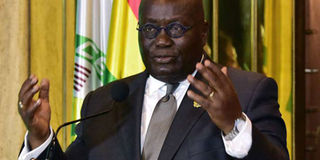Troubling questions about the future of democracy in Africa

This file photo taken on May 5, 2017 shows Ghanaian President Nana Akufo-Addo speaking to the press after a meeting with his Ivory Coast counterpart at the presidential palace in Abidjan. Ghana is, by African standards, a strong democracy. PHOTO | ISSOUF SANOGO | AFP
What you need to know:
- Not enough Kenyans believe Nasa's policy promises, such as the claim that they would fight corruption.
- There is a hell of a lot of corruption and waste of public funds, especially in public procurement.
Ghana’s election on December 7, 2016, was clearly hacked.
Not only was the Electoral Commission website breached and an attempt apparently made to announce fake results, but the electronic transmission system was thoroughly compromised.
“Our electronic transmission was not even coming. You key in, and figures will change. You key in and the figures will change. Then we said no, we can’t go on with this. Let’s abandon it,” Ghana Electoral Commission deputy chairperson Georgina Opoku Amankwa was reported as saying.
The commission counted and tallied the votes manually, delaying the announcement of results.
There were seven candidates in that interesting election.
AKUFO-ADDO
The big ones were the incumbent, President John Dramani Mahama of the National Democratic Congress, who was seeking re-election, and current President Nana Akufo-Addo, of the opposition New Patriotic Party, a former foreign minister and two-time presidential election loser.
Mr Mahama had inherited the term of President John Atta Mills, who had died in 2012.
In December that year, he won the election in his own right and was going for a second term in 2016.
Mr Mahama was doing quite well in the opinion polls going into the 2016 election – leading for four straight months – and with a significant momentum going into the election -- 54.7 per cent to Mr Akufo-Ado’s 43.7 per cent in a December 5 poll.
Two days later, though, he was handily defeated by Mr Akufo-Addo, who returned 54 per cent of the vote.
RIGGING
The run-up to the election was as murky as the time between the balloting and the announcement of the results.
There were allegations that NDC would rig the election and the opposition came up with the adopt-a-polling station idea where five opposition supporters were detailed to protect the vote during polling and counting.
When counting started, the system went haywire and for a day, both the opposition and the governing party claimed victory, based on their own tallies.
The media, too, were reporting their own counts.
DEMOCRACY
I have been reading hilarious news reports from the period about what ordinary folk believed happened during the election.
One spoke of a man who reported that Mr Akufo-Ado had hired a hacker from the NASA, the US space agency, to get into the election systems to prevent Mr Mahama from rigging.
Ghana is, by African standards, a strong democracy.
That these events took place in that country raises troubling questions about the future of democracy, and elections, in Africa.
Even more troubling is the fact that we have not asked searching questions about what transpired in our own recent election.
The opposition maintains – and gets very angry and announces a boycott against anyone who questions its position – that Jubilee stole the election.
NASA CLAIM
For ardent Nasa supporters no further proof is required.
To journalists and average Kenyans, though, there is a lot of passion and conviction from Nasa, but not enough in the way of empirical, incontrovertible proof.
Was it stuffing of ballot boxes? Where? Was it an algorithm in the servers?
Why did they not sue for a recount since only the transmission and tallying was electronic?
Personally, I believe that even though Jubilee folks might be congratulating themselves at how clever they were in surviving two rounds of a Nasa onslaught, the reason the Canaan brigade has not succeeded in overthrowing them is because many Kenyans, including some who voted for the opposition, are not convinced by Nasa’s arguments to make the sacrifices that would be necessary to threaten the viability of the Jubilee government.
CORRUPTION
For the first time, the opposition has a serious credibility problem.
Not enough Kenyans are lapping up its explanations about how it all went down.
Not enough Kenyans believe their policy promises, such as the claim that they would fight corruption.
This is not to say that the case that Nasa has made against Jubilee is entirely without grounds: There is a sense of exclusion.
There is an annoying assumption that President Uhuru Kenyatta will hand over to his deputy, Mr William Ruto, and that the rest of the political class, even those who are approaching 80, should shut up and get in queue.
PUBLIC DEBT
There is a serious problem with the management of the economy, especially debt and the export of taxes to China, through procurement and contracting.
There is a hell of a lot of corruption and waste of public funds, especially in public procurement.
Civil servants are assumed to be swimming in money, even though the economy is contracting, with heaps of companies reporting drastically reduced profitability.
There is also a lack of rigour and seriousness as evidenced in the recent honours fiasco.
These are not terminal problems, but they will determine whether Jubilee will survive the full term.
And it is by dealing with these things that the government can guarantee a relatively more peaceful and less anxious election come 2022.





